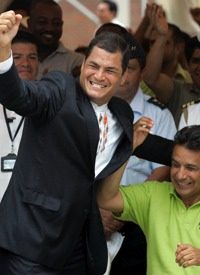
Correa’s reelection follows the approval by voters last year of a new constitution that removed many restrictions on the presidency. According to the New York Times, the anti-American socialist has become the most powerful president since military rule ended in 1979. He is also the first Ecuadorian president to be reelected in more than a century.
He easily defeated his two main opponents: former army colonel, president, and one-time coup leader Lucio Gutierrez, as well as billionaire banana tycoon Alvaro Noboa who has run unsuccessfully several times. Though reports about the final tally vary, it seems Correa received about half of the votes. Gutierrez is said to have garnered about 25 percent while Noboa earned a measly 12 percent.
Educated at Harvard and married to a Belgian woman, the reportedly devout Catholic is taking Ecuador down a path being traveled by an increasing number of South American nations. Correa defaulted on billions of dollars worth of foreign debt, calling it illegitimate. He has also expelled some American diplomats and nationalized the assets of uncooperative oil companies.
But despite his seeming popularity among the Ecuadorean people, Correa also has very sharp critics. “The election will be nothing more than a smokescreen that, under the guise of a democratic process, will strengthen Correa’s totalitarian, autocratic and anti-American regime,” wrote Edgar Teran before the election. The former Ecuadorian minister of foreign affairs and ambassador to the United States has also accused Correa of staging a coup on his first day in office, even refusing to swear the oath to uphold the constitution. “All vestiges of electoral freedom have disappeared in Ecuador,” he wrote, comparing the electoral process in Ecuador to the one in Cuba. He added that “future poverty, both moral and financial, is a certainty” with the loss of economic freedom currently being ushered in.
Correa has ambitious plans for Ecuador, and he seems intent on implementing them no matter what. He reportedly warned before the election that if the opposition gained a majority in the national Assembly, he would dissolve it. “Ecuadoreans will decide between a past of looting and injustice, or a much more beautiful future of change,” he told supporters as he wrapped up his campaign.
But his promises may be hard to keep. The Ecuadorean government, like Hugo Chavez’s regime in Venezuela, depends heavily on oil revenue to pay for the sprawling array of social welfare programs being rolled out. With oil prices depressed and plunging remittances being sent home from Ecuadorians abroad as jobs vanish in countries like the United States and Spain, the budget will be increasingly hard to fund. Analysts are speculating that if economic conditions don’t improve soon, the people could focus their anger on the president — especially now with the new-found concentration of power in the executive branch.
More and more South American countries are turning to statism to solve problems created by corrupt and inefficient governments in the first place. The trend is disturbing, particularly given socialism’s track record of spreading misery and poverty wherever it is implemented (consider Cuba). Correa was able to bribe the population into reelecting him by promising to continue taking from the “rich” and giving to the poor (and according to some, using government coffers to fund political propaganda). But the results of these senseless policies are always the same — poverty and government control. For the sake of South American people everywhere, let us hope these power-mongering leaders are exposed for what they are.
Photo: AP Images



